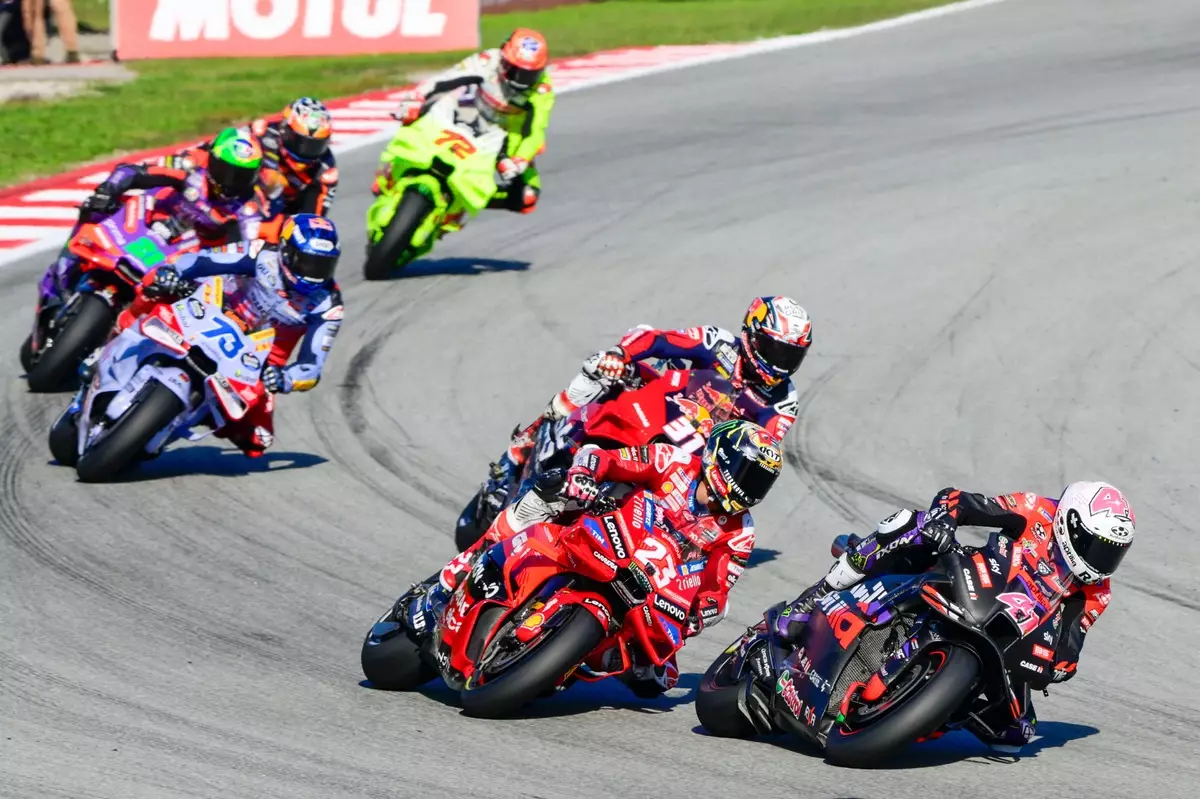In the fiercely competitive world of MotoGP, rivalries are often as thrilling as the races themselves. The recent Barcelona Grand Prix showcased not only the high-speed drama typical of the sport but also the underlying tensions between its participants. Ducati’s Enea Bastianini didn’t hold back in expressing his frustration toward Aleix Espargaro of Aprilia, accusing him of prioritizing his friendship with Jorge Martin over fair competition. This incident raises critical questions about sportsmanship, the ethics of racing, and the personal dynamics that can color competitive environments.
The Barcelona Grand Prix was pivotal for Jorge Martin, who was engaged in a tight championship battle with Francesco Bagnaia. Espargaro’s strategy throughout the race appeared to be that of a rear-gunner, as he intentionally impeded Bastianini’s progress in a bid to safeguard Martin’s title aspirations. Starting from the front row, Espargaro initially faltered but quickly transitioned into a role that was less about his performance and increasingly about protecting his friend. This shift not only affected his own race but also crucially impacted Bastianini, who was hungry for a top finish to strengthen his championship position.
Bastianini’s struggles became evident as he attempted to overtake Espargaro, whose robust defensive maneuvers thwarted each of Bastianini’s incursions. Eventually, these distractions culminated in a costly mistake that saw Bastianini slip to a seventh-place finish, marking a significant setback in his title chase. The anger radiating from Bastianini stemmed not just from his inability to compete effectively; it was exacerbated by his belief that Espargaro had compromised the race for personal allegiance.
In revealing his discontent, Bastianini stated that he found Espargaro’s racing tactics unprofessional. His comments suggest a growing concern over the intersection of personal relationships and competitive integrity in MotoGP. Bastianini felt robbed of a potential podium finish, while simultaneously expressing frustration at possibly unspoken rules of camaraderie that appear to override competitive spirit in such crucial moments.
For many observers, the incident highlighted a persistent dilemma in sports—friendship versus fairness. Espargaro’s actions, while undoubtedly loyal, drew criticism for adversely affecting not only Bastianini but the integrity of the race itself. The implication that a rider could play a pivotal role in another’s championship without regard for all competitors poses complicated questions regarding ethics that transcend the racing circuit.
Espargaro stood resolute in the aftermath, insisting that his performance was in no way a deliberate attempt to hinder Bastianini. He described his role as one of fierce competition, relating just how significantly he pushed the boundaries of both his skills and his bike to defend his position against Alex Marquez. His rebuttals included a pointed critique of Bastianini’s ability to keep pace, challenging the idea that he should bear any responsibility for Bastianini’s lack of competitiveness.
Espargaro characterized Bastianini’s critique as an oversimplification of a multi-dimensional race scenario. He emphasized that each rider has their own struggles on the track, and winning or losing often hinges on an array of both personal and team dynamics. This aspect of racing seems to have been overshadowed by Bastianini’s emotional response, illustrating the deep-seated frustrations that arise when a championship is on the line.
The dual narrative fueled by Bastianini and Espargaro exemplifies the complexities of competitive sports, particularly in high-stakes environments like MotoGP. The implications of their clash extend beyond this singular race. For Bastianini, the setback in Barcelona could fundamentally alter his trajectory for the remainder of the season, forcing him to recalibrate his strategy moving forward.
On the other hand, for Espargaro, this saga will linger in the minds of fans and pundits alike as they evaluate the ramifications of his actions in future races. As MotoGP continues to evolve, the tension between friendship and competition will remain a critical point of discussion among riders, teams, and fans, shaping how future battles are waged both on and off the track.
Ultimately, the Barcelona Grand Prix reminds us that in racing, much like life, allegiances can cloud judgment and professional boundaries can be tested, but the pursuit of victory remains at the heart of the competition.


Napsat komentář